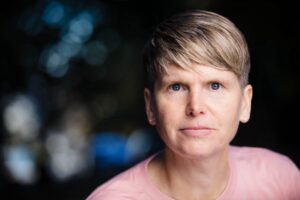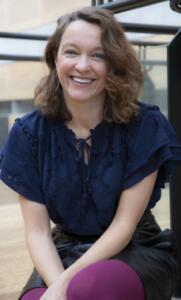The times and their tenor
Disembark
by Jen Currin
Toronto: House of Anansi, 2024
$22.99 / 9781487011895
Reviewed by Carellin Brooks
*

“Beach read” as a descriptor typically dismisses something as light and frothy, suitable for a hot day and immediate forgetting afterwards. And the phrase does fit Jen Currin’s Disembark, to a point.
Currin (Hider/Seeker) opens this fun, sprightly collection of short stories with a standard tale of tangled lesbian romances, fittingly titled “The Golden Triangle.” Young women meet and move into and out of each others’ lives, dating each other’s exes, having threesomes, and juggling multiple girlfriends. As one character remarks of her decision to move across the country: “There were women she hadn’t slept with yet, a huge, seemingly endless pool—an ocean, really.”
“Joey, When She Knew Him” describes another tangle: lesbians and gay men’s. At first comes recognition: “There was something endearing about his bedraggledness, his shy smile—she could tell right away he was family.” But bedraggled Joey, who “used to tell her all the time that he loved her,” eventually finds a husband and a new name, and his defection reminds the narrator—still poor, alone, and now middle-aged—of another friendship in high school with Michael, a young gay man. That one ended badly too, with the arrival of an attractive love interest of indeterminate gender, Mitch. The trio end up in a threesome, but it’s Michael that Mitch chooses. The soapy vibe is undercut by Sid’s sorrow at the loss, not only of Mitch but of Michael, and, by implication, all those men who choose each other over their lesbian sisters.

“The Dean Regrets” contrasts the jaded corporate-speak of the modern post-secondary institution (that Currin must know first-hand: they’re an instructor at Kwantlen Polytechnic University) with the layoffs, lost benefits, and decades-long union battles that are the reality for any adjunct. The main character, Laurel, is fobbed off with empty platitudes during an impromptu meeting with the new dean—a man of all style and no substance—before returning to a shared office and a previously issued layoff notice. Laurel’s subsequent resignation and self-blame feel familiar to anyone, this reader not excepted, who has ever worked in such a setting. “No matter how shitty this news is,” Laurel observes wearily, brandishing a pile of damp student papers, “I still have to get my grading done.”
Relationships are the keynote of these stories, whether with the girlfriend who makes lasagna to solace Laurel, a mad brother, a living mother, or one who, in the titular final story of the collection, having passed over herself, becomes the main character’s guide to the spirit world beyond.
The afterlife, it turns out, is very much like our everyday world: there are laptops, cigarettes, cellphones, and panel discussions where newcomers are required to explain why they died and how. As the mother and her offspring, Jo, bicker, Jo’s end is gradually revealed: “And suddenly you can feel the air turning to vicious wind, sluicing through you as you race downward toward the stench of rushing water, oil, and garbage. You remember thinking ‘I must be about to hit’ three times before you actually did.” Why did Jo do it? Because, perhaps like the mother herself, they “just wanted to disappear.”
In the most fantastical of these stories, the narrator finds it hard to get to sleep each night. Anxiety about the coming environmental apocalypse means our protagonist is awake when a tower of laundry in the corner of the bedroom shifts to reveal a visitor:
I watched as the pile started to shutter, black shirts and dirty tights falling down to the floor. The humming grew louder. A head emerged, bald, with a face puckered up like a knot of ginger.
The creature has made it out of the laundry pile by the time the narrator’s wife, Matilde, finally wakes up the next morning and heads for the living room. Seeing the old woman on the couch, Matilde freezes, then rounds on her spouse: “What the hell? You could have told me we have a fucking banshee in our house.”
“As was often the case,” the narrator comments dryly, “Matilde’s reaction was not what I expected.”
The magic realism of “Banshee” invites further questions. That the crone has arrived to sing the death knell of the natural world seems assured: “The rain. The floods the floods the floods,” she intones. But is she also performing last rites for the narrator and Matilde’s relationship? Or, as Matilde claims, does her presence mean one of them will literally die soon? The narrator, like us, is left with a puzzle, not just about the weirdness of the banshee’s appearance or how the world is heating up, but about the fate of their marriage. “I had wondered then, as I wondered now, what being supportive meant. How did we support each other? Where would we each be when it all ended?”
Overall, writer Jen Currin has managed to invest the stories in this collection with a bubbly sensibility welcome in the historically serious, sober, I daresay even dour halls of CanLit. But the jokes don’t prevent the stories from also addressing the serious matters of our loves and our times. How do we live? How can we? Such questions occupy Currin as they do the rest of us. Readers are fortunate: these stories not only chronicle our despair, but also gesture towards what lies beyond.
[Editor’s note: On June 4, at 7pm at the Lido, Currin launches Disembark (with Carleigh Baker).]
*

Carellin Brooks is the author of the poetry collection Learned (Book*hug, 2022) and four other books. She lives in Vancouver. [Editor’s note: Learned (Book*hug, 2022), a poetry collection about Brooks’ time at Oxford and in the fleshpots of London, was reviewed in BCR by Linda Rogers. Brooks has reviewed Daniel Zomparelli, Dina Del Bucchia, Mx. Sly, Debbie Bateman, Michael V. Smith, Buffy Cram and Maryanna Gabriel for BCR.]
*
The British Columbia Review
Interim Editors, 2023-25: Trevor Marc Hughes (non-fiction), Brett Josef Grubisic (fiction and poetry)
Publisher: Richard Mackie
Formerly The Ormsby Review, The British Columbia Review is an online book review and journal service for BC writers and readers. The Advisory Board now consists of Jean Barman, Wade Davis, Robin Fisher, Barry Gough, Hugh Johnston, Kathy Mezei, Patricia Roy, Maria Tippett, and Graeme Wynn. Provincial Government Patron (since September 2018): Creative BC. Honorary Patron: Yosef Wosk. Scholarly Patron: SFU Graduate Liberal Studies. The British Columbia Review was founded in 2016 by Richard Mackie and Alan Twigg.
“Only connect.” – E.M. Forster